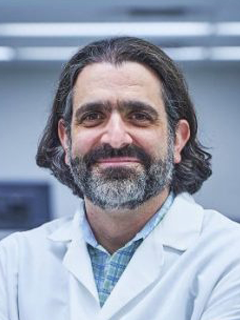HOW CAN WE HELP YOU? Call 1-800-TRY-CHOP
In This Section
Whole Genome Sequencing Project to Unlock Genetic Mysteries of Childhood Brain Cancer

The Center for Data-Driven Discovery in Biomedicine at CHOP leads a collaborative research project of whole genome sequencing for thousands of brain tumor samples, unlocking an unmatched level of information and insight into these devastating cancers.
“Your child has a brain tumor,” are words no parent wants to hear. But if the team at the Center for Data-Driven Discovery in Biomedicine (D3b) at Children’s Hospital of Philadelphia has their way, those words will become less daunting.
The pediatric population accounts for nearly 6 percent of all brain tumors — the leading cause of disease-related death in children, infants to 19-year-olds. Although it’s a rare disease, with an estimated 4,600 new cases of pediatric brain cancer to be diagnosed in the United States this year, the disproportionate amount of life lost compared to adult cancers represents an immense, yet unrecognized cost to society. Despite decades of clinical and laboratory research, several types of pediatric brain tumors remain largely incurable, highlighting the urgent need to improve therapies for these children.
With support from the National Institutes of Health, including the National Cancer Institute’s Childhood Cancer Data Initiative, Adam Resnick, PhD, co-director of D3b, and his research team are on their way to fulfilling that need. Dr. Resnick, who also serves as scientific co-chair of the Children’s Brain Tumor Network (CBTN), will lead a collaborative research project of whole genome sequencing for thousands of brain tumor samples, unlocking an unmatched level of information and insight into these devastating cancers. This project will position CBTN, a multi-institutional brain tumor research program with its operations center housed at D3b, for new research collaborations globally, bolstering researchers’ efforts to accelerate cures.
Largest Pediatric Brain Tumor Cohort Study
The CBTN samples to be sequenced — which comprise the largest, clinically annotated pediatric brain tumor cohort study to date — will include over 4,500 samples collected by D3b. These samples, generously donated by patients and their families at CBTN member institutions, include patient-derived tumors, normal tissue, and child-parent trios. Child-parent trios are samples collected from both parents and patients to search for specific gene mutations that may be responsible for the development of brain tumors. The molecular characterization process will prioritize the most aggressive tumor types, supporting research on those cancers where there is less existing data.
“While consortia-based initiatives by CBTN have advanced the molecular knowledge base of pediatric brain tumors,” Dr. Resnick said, “deeply phenotyped cohorts with parental germline as well as tumor sequencing remain lacking, with pediatric brain tumors lagging behind most other childhood cancers in available NIH-sponsored datasets. This project will address the significant unmet needs of children with brain tumors through the generation and integrative analysis of genomic data. We’ll uncover new insights for a broad scope of individual brain tumor diagnoses including trio-based cohorts of longitudinally-followed patients with deep clinical and phenotypic characterization.”
During the first year of this effort, D3b will undertake the considerable task of preparing and shipping the samples for sequencing, which will be completed by the Broad Institute of the Massachusetts Institute of Technology and Harvard.
Once the data are returned, the D3b team will quickly go to work cleaning them, a lengthy process they hope to accelerate, which entails identifying incomplete, incorrect, inaccurate, or irrelevant parts of the data and then replacing, modifying, or deleting any unusable data. Next, they’ll need to pull together data scientists and clinicians from around the world to synthesize and analyze the data. A large-scale hackathon is being considered for this stage.
Unlocking Genetic Mysteries
This CBTN dataset will be widely available to the entire research community as part of the NIH Common Fund’s Gabriella Miller Kids First Pediatric Research Program (Kids First), a collaborative research effort with the goal of understanding the genetic causes and links between childhood cancer and structural birth defects.
The successful completion of this project will not only improve the pediatric brain tumor data resources required for accelerated therapeutic advancement, but also empower cross-disease discovery more broadly — bringing D3b closer to their goal of unlocking the genetic mysteries behind pediatric brain tumors.
“Childhood brain tumors represent some of the most challenging targets for biomedical research due to the scarcity of molecular data available to make actionable discoveries,” Dr. Resnick said. “Through this partnership, the NCI/NIH and the Childhood Cancer Data Initiative have made possible a new era in research.”
